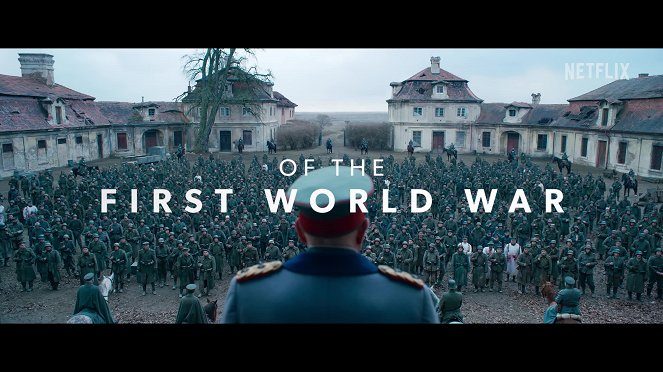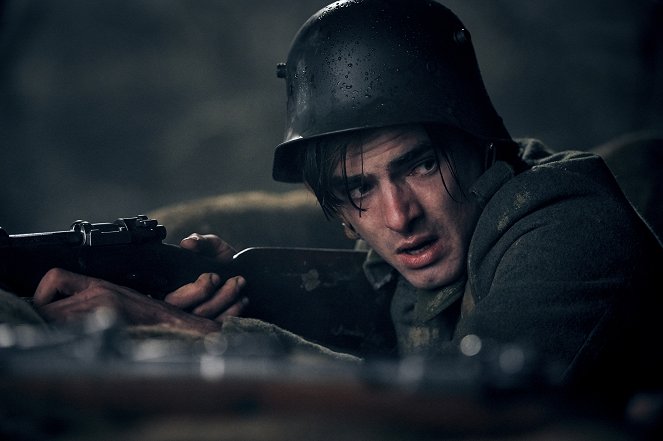Directed by:
Edward BergerCinematography:
James FriendComposer:
Volker BertelmannCast:
Felix Kammerer, Albrecht Schuch, Moritz Klaus, Aaron Hilmer, Adrian Grünewald, Edin Hasanović, Daniel Brühl, Devid Striesow, Sebastian Hülk, Andreas Döhler (more)VOD (1)
Plots(1)
All Quiet on the Western Front tells the gripping story of a young German soldier on the Western Front of World War I. Paul and his comrades experience first-hand how the initial euphoria of war turns into desperation and fear as they fight for their lives, and each other, in the trenches. The film from director Edward Berger is based on the world renowned bestseller of the same name by Erich Maria Remarque. (Netflix)
(more)Videos (4)
Reviews (10)
In the trailer, the All Quite on the Western Front teases us with visual exhibitionism, and you can't help but expect a proper war spectacle. Unfortunately, the opposite is true. For the entire 150 minutes or so, the filmmakers draw primarily on the formal identity of Saving Private Ryan, but miss the best moments entirely. Anyone who has seen Spielberg's opus remembers the names of the main characters: good guy Captain Miller, tough guy Captain Caparza, Ryan of course, not to mention iconic scenes like Normandy or the battle in the city; plus, with a hard-to-beat level of shocking authenticity and Kaminski's mastery of cinematography. Here, 10 minutes after the screening, you don't remember a single name and perhaps only one memorable scene – the one with the general in the puddle. Iconic, innovative and precisely crafted cult-classic vs. generic German filmmakers' wartime turmoil that is more akin to Hacksaw Ridge or We Were Soldiers. I deliberately mention Gibson’s films, because the level and depiction of violence is quite similar here. It might grab you by the balls for a second, but you’ll easily forget about it in a couple of minutes. It's still a solid film for Germans standards, with some spectacular and polished visuals in places, but it's not going to become a classic by any stretch of the imagination. For that, the story is blandly executed, the actors are lackluster and the action is too monotonous.
()
The repetitive alternation of the heat of battle and the coldness of waiting, the recurring motifs for unimaginative half-wits, the book’s premise stripped of all its compelling scenes, which the film replaces with simple (and sometimes unrealistic) war porn and a completely hollow political storyline. The film fails to approximate Remarque’s insistent humanism except by literally illustrating the conflict of minor and major history, which doesn’t make a lot of sense (the horrors of the First World War didn’t actually consist in the fact that Foch wanted an armistice in six days and the Germans needed to think it over). As an adaptation, this is a disaster, devoid of psychology and with no thoroughly developed characters, and as a film it’s drawn out, transparent and superficial. The versions from 1930 and 1979 had something to them, but this fails even as a stand-alone work. Netflix’s problem isn’t the lack of casting actors of color. Its problem is that its projects lack dramaturgy and thus don’t much sense.
()
Clear winner of this year's war films, and for me better than 1917 and Dunkirk (Hacksaw Ridge is a little higher in my heart though). I haven't read the book, nor have I seen the original, I just know that it's an adaptation of a literary classic by Remarque and I think the film stood up to it on all counts. From the very beginning the film thrusts us into the action of the war itself, which I very much appreciate – thankfully there is no hour-long introduction to the characters before the war, everything happens on the fly and thanks to that the film also has a decent pace and never gets boring. Edward Berger has his craft down pat, technically it's a decent work, with epic music that adds to the atmosphere and tension. The characters didn't really grow on me, except for the main one, so emotionally it didn't hit me that much, although it is sad in places. I found it interesting to watch a war film from the perspective of the Germans, usually it's the other way around, so the film is definitely unusual in that way too. I enjoyed the scenes with the General screaming for himself (the final speech was great) and the armistice negotiations on the train were also interesting. There's not a lot of action scenes, though, there are only three epic battles, but since the film is set in a battlefield most of the time, I didn't mind. The highlight is the sequence in the middle where the tanks and flamethrowers come on the scene – you can feel the true despair and horror of war, really uncomfortable. As for the gore, there's not much of it either, but there are a couple of brutal shots (the tank running over probably sticks in the mind the most), so for me really big satisfaction and I would say it’s the best WW1 war film. Definitely an Oscar snatcher here and kudos to Netflix. 8.5/10.
()
In All Quiet on the Westen Front, there is only one shot - a long sequence with an imperceptible travelling forward - where the face of the actor Felix Kammerer (arguably the main character of the movie) appears in full screen, in its absolute and preserved peacefulness. The viewers understand he has just been passing, in the franco-german trenches, ironically by the exact time of enactment of the Armistice. Edward Berger seems to tell us: Death is beautiful. Yes it can be so after more than two hours of tragic absurd and dreadful description of events seen from the exclusive point of view of the (German) losers of the First World War, where no death is spared to the viewers. And where so many young men fell to their death or became orendously mutilated in the name and for the honour of their country and its political and military leaders. Such a unique waste may be alluded to by Edouard Berger in the first scene of the movie, filmed in a low angle, of a mother fox and her babies, warmly pressed against each other below earth in their burrow. Only human animals can find in themselves the will, strength and illusion of fighting till death for an abstract political concept such as that of territorial homeland. We are thus reminded of those so-called "primitive" societies that were shedding tears upon the birth of any new born child, in anticipation of the difficulties and challenges to come that she or he would have to face later on in life. And, as can be expected from said people, the members of these tribes were celebrating joyfully the passing of any of them, as a testimony of the end of earthly hardships for the deceased. And in between birth and death, according to what may be one of the meaning of this movie, there is only cynism. No place for any hope of redemption for any of its characters, all passively blown away by the craziness of war. At the end ,what remains is the impression of a too long and familiar scenario of the same senselessness . The quality of the photography by James Friend is to be highlighted.
()
I have to start by saying what a pity it is that the film went directly to Netflix and not to cinemas. It was not as immersive an audiovisual experience as 1917 or Dunkirk, but still, many scenes would have been great on the big screen. I was a little hesitant to see the film at first, but I was surprised to learn it was nominated in nine categories for the Academy Awards, so I had to see for myself. Although the film is called All Quiet on the Western Front, it is a rather loose adaptation, which I personally didn't mind; the source material matter may have been viewed from a slightly different perspective, with an emphasis on the contrast between the "insignificant" soldiers in the sodden trenches with no food and the "big" men in the heat with plenty of food, but the basic ideas of the horrors and futility of war, as well as the stolen youth at the expense of "higher" goals, are present. I commend the film's reliance on rather unknown faces in most cases, though in the case of the protagonist I kept thinking about Rupert Grint. Although the film is nearly two and a half hours long, it managed to keep me engaged for the entire running time (the soundtrack, which was at times very dissonant to my ears, was harder to get used to), whether it was the realistically rendered and frightening shots of the front line (the arrival of tanks, flamethrowers and the flooded hole sequence will stay in my head for some time to come), the banter among comrades, or the theft of poultry. But the nine nominations seem excessive, even though the result is (at least technically) a fine film.
()



Ads